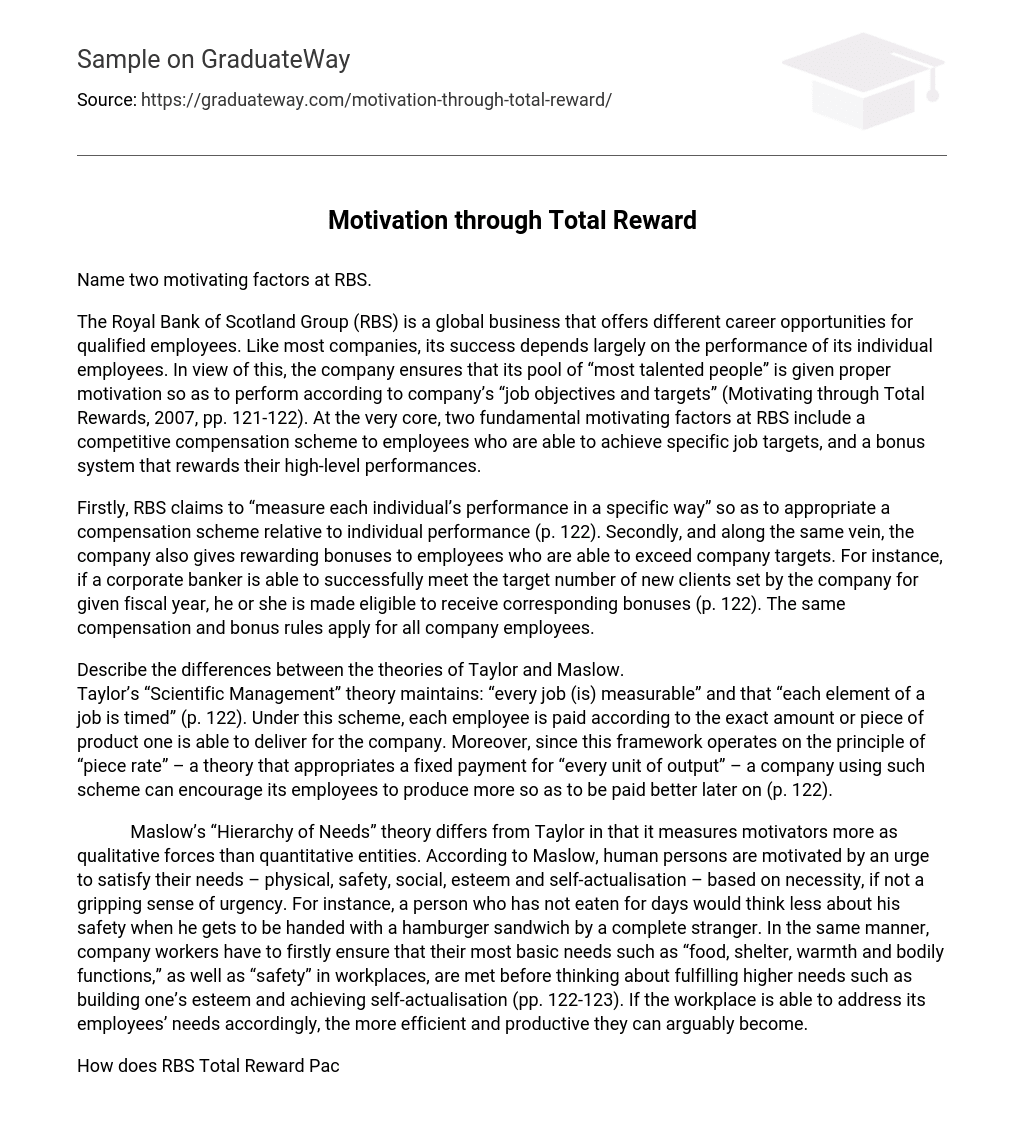Name two motivating factors at RBS.
The Royal Bank of Scotland Group (RBS) is a global business that offers different career opportunities for qualified employees. Like most companies, its success depends largely on the performance of its individual employees. In view of this, the company ensures that its pool of “most talented people” is given proper motivation so as to perform according to company’s “job objectives and targets” (Motivating through Total Rewards, 2007, pp. 121-122). At the very core, two fundamental motivating factors at RBS include a competitive compensation scheme to employees who are able to achieve specific job targets, and a bonus system that rewards their high-level performances.
Firstly, RBS claims to “measure each individual’s performance in a specific way” so as to appropriate a compensation scheme relative to individual performance (p. 122). Secondly, and along the same vein, the company also gives rewarding bonuses to employees who are able to exceed company targets. For instance, if a corporate banker is able to successfully meet the target number of new clients set by the company for given fiscal year, he or she is made eligible to receive corresponding bonuses (p. 122). The same compensation and bonus rules apply for all company employees.
Describe the differences between the theories of Taylor and Maslow.
Taylor’s “Scientific Management” theory maintains: “every job (is) measurable” and that “each element of a job is timed” (p. 122). Under this scheme, each employee is paid according to the exact amount or piece of product one is able to deliver for the company. Moreover, since this framework operates on the principle of “piece rate” – a theory that appropriates a fixed payment for “every unit of output” – a company using such scheme can encourage its employees to produce more so as to be paid better later on (p. 122).
Maslow’s “Hierarchy of Needs” theory differs from Taylor in that it measures motivators more as qualitative forces than quantitative entities. According to Maslow, human persons are motivated by an urge to satisfy their needs – physical, safety, social, esteem and self-actualisation – based on necessity, if not a gripping sense of urgency. For instance, a person who has not eaten for days would think less about his safety when he gets to be handed with a hamburger sandwich by a complete stranger. In the same manner, company workers have to firstly ensure that their most basic needs such as “food, shelter, warmth and bodily functions,” as well as “safety” in workplaces, are met before thinking about fulfilling higher needs such as building one’s esteem and achieving self-actualisation (pp. 122-123). If the workplace is able to address its employees’ needs accordingly, the more efficient and productive they can arguably become.
How does RBS Total Reward Package fulfill Maslow’s higher levels of motivation?
Consistent with the theory of A. Maslow, RBS has adopted a programme that is aimed at adequately fulfilling the varying needs influencing employee-motivations. This is called the Total Reward Package – a human resource and management strategy that goes beyond the usual salary-payment scheme (p. 123). Maslow’s theory emphasizes the fact that monetary compensation alone cannot sufficiently fulfill the varying needs of the human persons. In view of this, RBS has decided to employ the principle of Total Reward so as to allow its employees to enjoy an array of personally rewarding benefits. For instance, the company offers “flexible working hours” and a medical coverage to help employees satisfy their basic physical needs (p. 123). This aspect, if only to repeat, is a fundamental aspect in Maslow’s hierarchy of needs. For when employees are able to move and work within their respective frames, they are able to address their basic needs more efficiently and thus yield better results for the company. Furthermore, RBS allows its employees to enjoy “paid holidays” and “flexible pension funding” benefits. This is done to address their social and self-esteem needs. Hardly over, the company offers “confidential advice service” and avenues for “personal development and training” as well. RBS believes that by offering employees “a chance to develop a lifelong career” with them, the company is able to address its employees’ self-actualisation needs. (p. 123).
How does Total Reward contribute to RBS overall strategy?
The basic premise underlying the practice of Total Reward Package lies in the idea that a motivated workforce yields beneficial results for the company. In principle, a company puts a substantial amount of investment to empower its employees in the hope of they would in turn perform efficiently for the sake of the company’s continued growth and progress. In many ways, putting Total Reward Package into a practicable use for RBS has proven to be rewarding not only for the employees but also for the company itself. There is no denying this fact. It is surely not for nothing that RBS employs more than 140,000 people to cater to around 36 million clients worldwide (p. 121). As indeed, it is not for nothing that RBS has been deemed as one of the world’s leading financial services companies at present.
It is noteworthy to likewise mention that RBS’s effort to implement Total Reward Package in the company has won the admiration of various organizations. In fact, the company’s “Your Time” flexible working scheme has received the “HR Excellence award for ‘The Most Effective Use of Flexibility in the Workplace’ in 2004” (p. 124). If results speak volumes for themselves, then they merely show how the Total Reward Package has been successful in delivering beneficial results for RBS.
Reference
The Royal Bank of Scotland Group. (2007). “Motivating through Total Reward”. The Times Newspaper Limited and MBA Publishing Limited. <www.thetimes100.co.uk>





